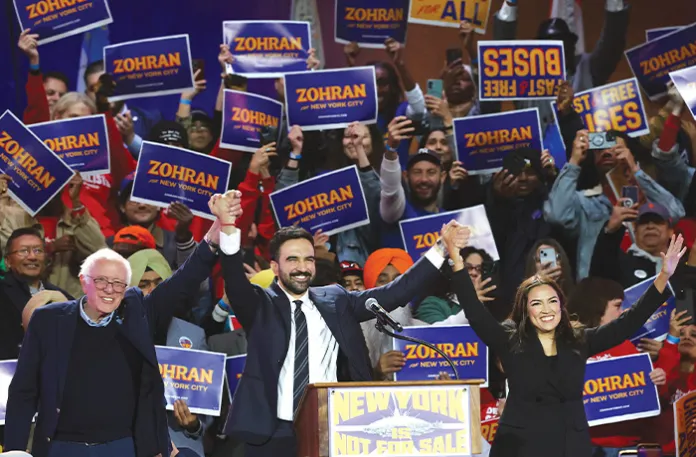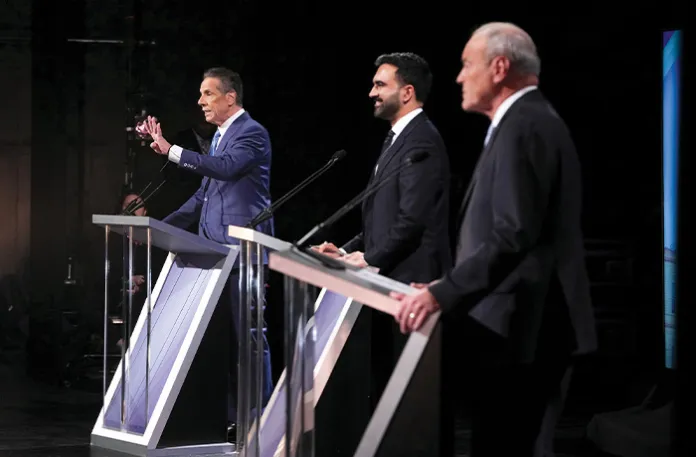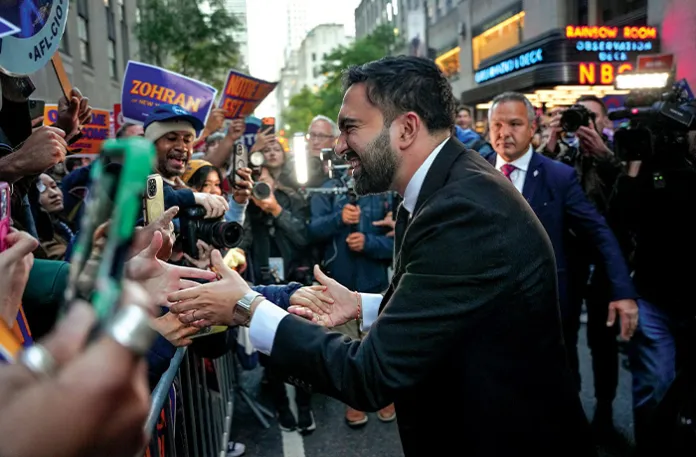In the shadow of the world’s largest Jewish community outside Israel, New York City stands on the precipice of an electoral anomaly. With just days until the 2025 mayoral election, at the time of this writing, Democratic nominee Zohran Mamdani, a 34-year-old state assemblyman from Queens, holds a commanding lead in the polls — 44% support among likely voters, according to a Suffolk University survey released on Oct. 27. His closest challenger, independent former Gov. Andrew Cuomo, trails at 34%, while Republican Curtis Sliwa and incumbent Mayor Eric Adams, who will still be on the ballot even though he withdrew from the race in late September, languish in single digits. Early voting turnout shattered records, with 164,190 check-ins recorded in the first two days, signaling a high-stakes contest for the nation’s most populous city.
Mamdani’s ascent is nothing short of stunning. A socialist and member of the Democratic Socialists of America, he shocked the political establishment in June by clinching the Democratic primary with a 12-point victory over Cuomo in ranked choice voting. Backed by progressive icons like Sen. Bernie Sanders (I-VT) and Rep. Alexandria Ocasio-Cortez (D-NY), who rallied with him before 13,000 supporters in Queens on Oct. 26, Mamdani has galvanized young voters and left-leaning unions with promises of rent freezes, free city buses, and a $30 minimum wage by 2030. His campaign’s populist flair, printing Yiddish-language posters to court Hasidic voters and pledging an 800% increase in anti-hate crime funding, has broadened his appeal beyond traditional bases.

Yet beneath this veneer of inclusivity lies a profound unease, particularly among Jewish New Yorkers like myself, who number over 1.3 million and comprise 13% of the electorate. For us, Mamdani’s rise evokes not just policy disagreements but existential dread. As Rabbi Elliot Cosgrove of Manhattan’s Park Avenue Synagogue declared in an Oct. 18 sermon, echoed by over 1,000 rabbis nationwide, “Zohran Mamdani poses a danger to the security of New York’s Jewish community.” A Fox News poll from mid-October found Jewish support for Mamdani at just 38%, with 42% backing Cuomo — a near split that underscores the community’s fracture. More alarmingly, Mamdani’s unyielding anti-Zionism, his reluctance to denounce Hamas-linked rhetoric unequivocally, and his framing of Israel as a “settler-colonial” entity have ignited fears that his leadership could normalize antisemitism in a city still reeling from a surge in hate crimes post-Oct. 7, 2023.
This is no abstract debate. New York — with its hundreds of synagogues and its nearly equal number of kosher restaurants and delis (that’s right: In Judaism the eating really is just about as important as the praying!), its hundreds of Jewish schools, and its bustling Jewish cultural hubs from Borough Park to the Upper West Side — has long been the epicenter of Jewish life in America. But Mamdani’s worldview, rooted in a rejection of Jewish national self-determination, strikes at the core of that identity. In a city where Jewish voters turned out at an estimated 25% to 28% in key primary districts, his candidacy forces a reckoning: How did a figure who equates the New York City Police Department with the Israel Defense Forces, refuses to affirm Israel’s right to exist as a Jewish state, and hesitates to call for Hamas’s disarmament come to lead the Democratic ticket? And what does his likely victory portend for a community that views Zionism not as an ideology but as a bulwark against annihilation?
A youth shaped by anti-colonial critique
To understand Mamdani’s positions, one must trace them to his upbringing. Born in Kampala, Uganda, in 1991 to Indian-Ugandan parents — Mira Nair, the Oscar-nominated filmmaker behind Monsoon Wedding, and Mahmood Mamdani, a Columbia University professor renowned for his work on colonialism — Mamdani immigrated to New York at age 7. His family’s peripatetic life spanned Uganda, South Africa, and Manhattan’s Upper West Side. As a child, he requested bedtime readings from his father’s scholarly tomes on decolonization, absorbing a lens that views power structures through the prism of oppression.
Mahmood Mamdani’s influence looms large. A leading theorist of “settler colonialism,” he argues in his 2020 book Neither Settler nor Native: The Making and Unmaking of Permanent Minorities, dedicated to Zohran, that modern nation-states, including the United States and Israel, perpetuate violence by creating “permanent minorities” through ethnic cleansing and reservations. He has described Zionist settlement in Palestine as an “ongoing process” of exiling non-Jews, drawing parallels to American treatment of Native Americans, which he claims inspired Nazi genocide. In academic writings and interviews from around 2014, Mahmood Mamdani argued that Jewish national self-determination should not take the form of an exclusive nation-state, a view he reiterated in contexts critiquing so-called “settler-colonial” frameworks. Zohran has echoed this framework since his youth, co-founding Bowdoin College’s Students for Justice in Palestine chapter in the early 2010s and authoring a 2014 op-ed decrying Israeli universities as “complicit in the crimes of … the Israeli government in all its settler-colonial forms.”

This intellectual inheritance manifests in Mamdani’s activism. During the 2014 Gaza conflict, he severed ties with J Street U, a pro-Israel student group and a left-wing alternative to the American Israel Public Affairs Committee that advocates a two-state solution, deeming collaboration “normalization.” He has long supported the boycott, divestment, and sanctions movement, calling it a “legitimate” tool for “compliance with international law” at a UJA-Federation forum. In the New York State Assembly since 2021, he sponsored the “Not On Our Dime!” bill in 2023, aiming to bar tax-deductible donations to groups supporting Israeli settlements — legislation critics label a BDS Trojan horse.
Arguably even more troubling than Mamdani’s radical anti-Zionism is his relative inexperience. Elected to the assembly in 2020 after working as a foreclosure prevention counselor, he has prime-sponsored just 20 bills, three of which became law by May 2025 — modest compared to the executive heft required to run the largest city in the country. Critics like Cuomo have been hammering this point: “Mayor of New York should not be your first job.” Mamdani’s radicalism outpaces his resume. As City Journal noted in June, his antagonism toward Israel is “long-standing, ideological, and far more radical than even that of moderate critics.”
The Oct. 7 reckoning: Hesitation and equivocation
No episode crystallizes our alarm more than Mamdani’s response to the Oct. 7, 2023, Hamas attacks, which killed 1,200 Israelis, mostly civilians, in the deadliest assault on Jews since the Holocaust. The day after, as fog of war reports swirled, Mamdani issued a statement mourning Palestinian losses without mentioning Hamas or condemning the atrocities. “Every death is a tragedy, whether civilian or combatant,” he wrote, urging de-escalation while critiquing Israeli “occupation.” By Oct. 12, he was assailing Gov. Kathy Hochul’s (D-NY) call for Palestinians to reject Hamas as “dehumanizing,” and on Oct. 13, he amplified protests supporting “Palestinian resistance.”
On the second anniversary, Oct. 7, 2025, Mamdani’s statement drew bipartisan fire. He mourned the “1,100 Israelis killed” and demanded hostage releases but pivoted to accuse Israel of a “genocidal war” with a death toll “far exceed[ing] 67,000” (though no credible source had reported a 67,000-death toll by that date), calling the U.S. “complicit.” Israel’s government deemed it “shameful,” while New York Deputy Mayor Fabien Levy clarified: “This is not a statement about October 7 … [but] how much Zohran doesn’t believe in Israel’s right to exist as a Jewish state.” Even leftists like Aaron Maté of the Grayzone criticized Mamdani for adopting “propaganda” on the Israeli death toll.

This pattern of equivocation peaked in an Oct. 15 Fox News interview, during which host Martha MacCallum asked twice if Hamas should disarm and cede Gaza leadership per a Trump-brokered ceasefire. Mamdani demurred: “I don’t really have opinions about the future of Hamas and Israel beyond … justice and safety … abiding by international law.” The next day, at a debate, he appeared to backtrack, affirming that Hamas is a “terrorist organization” but refusing to call on Hamas to disarm. Haaretz called it a “failure” of the “Hamas test,” while the Free Press labeled him unable to say “yes” to disarming terrorists.
Mamdani’s defenders do include some progressive Jews like those at Jews for Racial and Economic Justice because, well — you can always count on a certain contingent of far-left Jews to back leftist candidates, no matter how deleterious their policies may be for the Jewish community. A JFREJ canvassing event on Oct. 21 distributed “Jews for Zohran” shirts (which, at least to me, is no different than distributing “Red Sox fans for Derek Jeter” shirts). Yet mainstream voices, from the American Jewish Committee to 650-plus rabbis in an Oct. 24 letter, decried his rhetoric as “beyond policy” — a “bigoted view of the Jewish people” that normalizes anti-Zionism as hate. The AJC urged Mamdani to “change course,” citing his “genocide” label for Israel’s operations as “deeply offensive.”
Echoes of intifada: Uncondemned calls to violence
Mamdani’s reticence extends to slogans that Jewish leaders have equated with incitement. When asked repeatedly about “globalize the intifada,” a chant invoking Palestinian uprisings marked by suicide bombings and civilian deaths, he sidestepped. In a June 17 Bulwark podcast, he called it an “expression of Palestinian rights” akin to the Warsaw Ghetto Uprising, prompting outrage from the U.S. Holocaust Memorial Museum as “outrageous … to survivors.” On NBC’s Meet the Press on June 29, after being pressed three times, all he could muster up was: “That’s not language that I use … the role of the mayor is not to police speech.” (Excuse me? Is it not also the role of the mayor of New York City — the site of the deadliest terrorist attack in U.S. history — to at least condemn terrorism and suicide bombings? Or is that too much to expect?) Only in July, after heavy backlash, did he privately vow to “discourage” it, per the New York Times. Why, though, could he not condemn it outright immediately, like any other sensible human being would do? This is the man about to become mayor of New York City? (Now you might be starting to see why those of us who’ve been following this campaign have been using the shaking-my-head and the my-head-is-exploding emojis at an estimated 5,000% higher than normal rate while texting among ourselves during these past few weeks and months.)
Mamdani’s failure to condemn terrorism immediately is part of a broader pattern. In 2021, he identified with the “anti-Zionist movement” and chanted “BDS!” outside Israel’s consulate alongside Within Our Lifetime, a group whose signs read, “There is only one solution, Intifada Revolution.” He declined a 2025 resolution affirming Israel’s right to exist and, in September 2023, linked NYPD tactics to IDF training: “When the boot of the NYPD is on your neck, it’s been laced by the IDF.”
Our reactions have ranged from unease to alarm. A Washington Post analysis on Oct. 25 described debates over antisemitism “exploding” in the “most Jewish city in America.” At a Park Slope synagogue event, attendees voiced fears of BDS’s economic bite on Israel’s ties. As Forward columnist Sruli Fruchter wrote on Oct. 23, Mamdani’s “double-talk” raises doubts about his readiness to combat left-wing antisemitism, from blacklisting Zionist therapists to accusing Hillel of “genocide.”
Settler colonialism: Delegitimizing the Jewish state
Central to Mamdani’s critique is “settler colonialism,” a term he and his father wield to portray Israel as an illegitimate “ethno-state” imposed on indigenous Palestinians. (Never mind that there were Jews in the Land of Israel long before there were Palestinians — and never mind that Jews have been living in the Holy Land not only since before the birth of Muhammad but even before the birth of Christ — but, yes, in Mamdani’s worldview, only one group in the land has a claim of being “indigenous” to it.) In his 2014 op-ed, Mamdani accused Israel of “crimes … in all its settler-colonial forms.” He singles out Israel among nations, ignoring ethno-nationalist states like Jordan or Saudi Arabia, and echoes Soviet-PLO propaganda framing Zionism as racism — a trope amplified by Wahhabi Islam and, historically, Nazis via figures like Haj Amin al Husseini.
This delegitimization, per the AJC, attacks “Jewish peoplehood” and creates “conditions for the elimination of the Jewish state.” Over 800 rabbis warned in their letter that it treats “Jewish self-determination as a negotiable ideal,” endangering “Jewish inclusion.” Mamdani’s Oct. 22 debate refusal to affirm Jewish national rights, saying he supports “equal rights” but not a “Jewish state,” drew Cuomo’s rightful rebuke.
THE SOCIALIST WHO BENEFITED FROM SELECTIVITY NOW WANTS TO BAN IT
Mamdani’s views threaten not only Jews but all New Yorkers. His DSA ties, endorsing 2020’s “defund the police” while now pledging collaboration, undermine trust in law enforcement amid rising hate crimes (up 20% post-Oct. 7). His “Not On Our Dime” bill could chill charitable giving. Economically, rent freezes risk landlord exodus and housing shortages, while unfunded free buses would strain a budget that is already $10 billion in the red.
For New Yorkers, the stakes of this race are dire. For Jews, they are visceral: A mayor who views Zionism as colonialism betrays a gross ignorance (and perhaps even an animus) to fundamental Jewish security needs in living memory of a time when Jews — because we had no place to go, and no state of our own to protect us — were slaughtered like cattle by a regime that ascribed to radical political theories that also delegitimized Jews as a people endowed with the rights that all other peoples on Earth enjoy. As Cosgrove warned, Mamdani’s meek “tolerance” of Jewish self-determination “betrays a bias so deeply held that it should make us shudder.” In a post-Holocaust world, where Israel may be our only refuge if all other countries once again choose to close their doors to us as they did in the 1930s and ’40s, this isn’t policy — it’s peril. New Yorkers must choose: a city of safety and self-determination or one where radical ideology erodes both.
Daniel Ross Goodman is a Washington Examiner contributing writer and the Allen and Joan Bildner Visiting Scholar at Rutgers University. Find him on X @DanRossGoodman.
